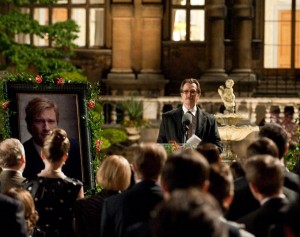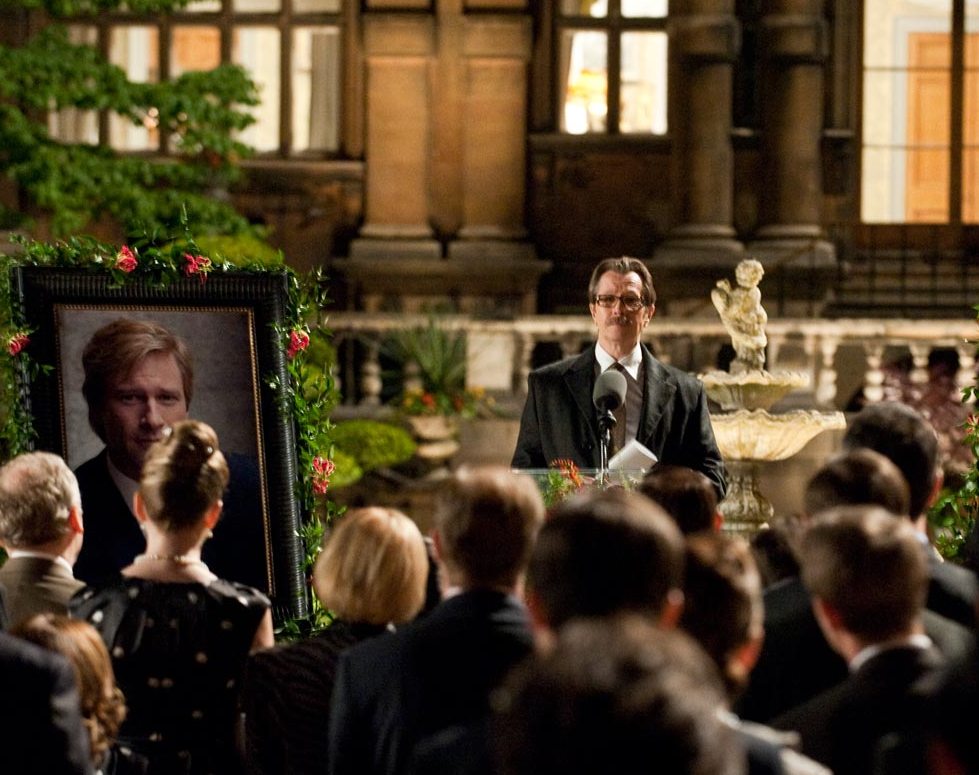 “I knew Harvey Dent. I was his friend. And it will be a very long time before someone… Inspires us the way he did. I believed in Harvey Dent.” – Jim Gordon
“I knew Harvey Dent. I was his friend. And it will be a very long time before someone… Inspires us the way he did. I believed in Harvey Dent.” – Jim Gordon
In Batman Begins, he stood against corruption when his fellow cops were corrupt. He did his best to clean up the system. However, at the end of The Dark Knight he compromised his principles, covered things up, took a short cut to help stabilize the city and build Gotham’s future on a tenuous lie. The principles we see in Commissioner Gordon’s early career are tainted, and the effects of this have worn him down to a shadow of the man he once was as The Dark Knight Rises. We talked about the overarching themes in our spoiler-free video review, but now we’ll careen into SPOILER territory (you’ve been duly warned) with these follow-up posts by looking individually at Alfred, Bruce, Gordon, Blake and Selina.
Getting Gordon
Jim Gordon had already made other mistakes in The Dark Knight, errors one might say contributed to Harvey Dent’s downfall. The District Attorney warned Jim some of his men weren’t reputable, but Gordon blows this off because he sees no alternatives. Trusting in a few of these officers leads to abductions and death. This isn’t to suggest you or I would have handled it better, but these times when Gordon settles or compromises truly come back to haunt him and have tortured his soul for eight years as the movie begins.
 “The Batman did not murder Harvey Dent–he saved my boy. Then Batman took the blame for Harvey’s appalling crimes, so that I could, to my shame, build a lie around this fallen idol. I praised the madman who tried to murder my own child. The things we did in Harvey’s name brought desperately needed security to our streets. But I can no longer live with my lie. It is time to trust the people of Gotham with the truth…”
“The Batman did not murder Harvey Dent–he saved my boy. Then Batman took the blame for Harvey’s appalling crimes, so that I could, to my shame, build a lie around this fallen idol. I praised the madman who tried to murder my own child. The things we did in Harvey’s name brought desperately needed security to our streets. But I can no longer live with my lie. It is time to trust the people of Gotham with the truth…”
Can you imagine being Gordon’s wife – or his children – in this city as the man who terrorized them at gunpoint is put on a pedestal each day? When they first mentioned Jim’s wife left him and took the kids to Cleveland I thought they were in reference to his own obsessive tendencies and internalization, but then realized how sick they would feel seeing Harvey’s face plastered over the city as a symbol of hope. Gordon’s cover-up cost him his family, and only granted the city a temporary reprieve and the illusion of peace. Crime dropped, but poverty and all the other social problems still ran rampant, festering and building like a powder keg until it literally burst from the sewers.
“A false witness will not go unpunished, and he who breathes out lies will not escape.” – Proverbs 19:5
 Lies are exposed and Gordon feels the weight of that, a temporal blow that puts him out of commission for much of the film. Even the young man whom he’s grooming to be the next good cop is disgusted at the moment of revelation, remarking how dirty Gordon’s hands are. The third act of the film shows Gordon’s repentance, as he is willing to lay down his life to go before the people and give them real hope instead of fabricated truth. In his final scene with Batman, the film’s heroic central figure reminds Gordon of his youthful idealism and compassion, the heart he had years ago when he comforted a young Bruce Wayne:
Lies are exposed and Gordon feels the weight of that, a temporal blow that puts him out of commission for much of the film. Even the young man whom he’s grooming to be the next good cop is disgusted at the moment of revelation, remarking how dirty Gordon’s hands are. The third act of the film shows Gordon’s repentance, as he is willing to lay down his life to go before the people and give them real hope instead of fabricated truth. In his final scene with Batman, the film’s heroic central figure reminds Gordon of his youthful idealism and compassion, the heart he had years ago when he comforted a young Bruce Wayne:
“A hero can be anyone. Even a man doing something as simple and reassuring as putting a coat around a little boy’s shoulders to let him know that the world hadn’t ended.”
 Actor Gary Oldman expresses Gordon’s depths of regret perfectly in the way he carries himself, burdened by the truth in the pocket of the long coat he wears, its weight looking as if it is pulling him down, his frame weary and face bled of all joy. When he first interacts with Blake on the rooftop next to the broken bat symbol, even his smile looks forced and pained. When the beacon is restored at the film’s end, the look of relief is not overly demonstrative, but a warm sigh of immense relief in knowing recognition of the return of joy. Although maybe not essential to Nolan’s narrative, the only other thing I would have loved to see was a nod to his family reconciliation, a knock at the door and Gordon facing his wife, the first steps in repairing almost a decade of damage.
Actor Gary Oldman expresses Gordon’s depths of regret perfectly in the way he carries himself, burdened by the truth in the pocket of the long coat he wears, its weight looking as if it is pulling him down, his frame weary and face bled of all joy. When he first interacts with Blake on the rooftop next to the broken bat symbol, even his smile looks forced and pained. When the beacon is restored at the film’s end, the look of relief is not overly demonstrative, but a warm sigh of immense relief in knowing recognition of the return of joy. Although maybe not essential to Nolan’s narrative, the only other thing I would have loved to see was a nod to his family reconciliation, a knock at the door and Gordon facing his wife, the first steps in repairing almost a decade of damage.
Although most of us aren’t police commissioners, many of us can identify with this Gothamite:
-
Do you have pent up regrets like Jim Gordon? A year’s worth? A lifetime?
-
Are you shackled by hidden truths and the uncertainty of how to move forward?
-
Who have you lied to? Wife, brother, sister, parents, or more?
-
Are you afraid of the truth and its consequences? Is it truly worth keeping hidden?
-
What would repentence look like if you were truly set free to pursue it?
-
Might you be beckoned back to the way you once were, or should be?
-
Are you afraid it’s too late? That you’re beyond forgiveness or ability to change?
![dkr-bat-gordon[1]](http://cinemagogue.com/wp-content/uploads/2012/07/dkr-bat-gordon1-300x184.jpg) Batman’s words encourage Gordon to once again be the forthright, stalwart man he had been years earlier, and the film makes us believe he embraces that quality once again, a quality Gordon himself sees in John Blake early in the film (but we’ll talk more about Blake in the next post). It’s also symbolic that the final battle atypically takes place in the daytime, just after dawn: one of the messages of The Dark Knight Rises is that it’s never too late to step off the compromised, dark path and into the light.
Batman’s words encourage Gordon to once again be the forthright, stalwart man he had been years earlier, and the film makes us believe he embraces that quality once again, a quality Gordon himself sees in John Blake early in the film (but we’ll talk more about Blake in the next post). It’s also symbolic that the final battle atypically takes place in the daytime, just after dawn: one of the messages of The Dark Knight Rises is that it’s never too late to step off the compromised, dark path and into the light.

